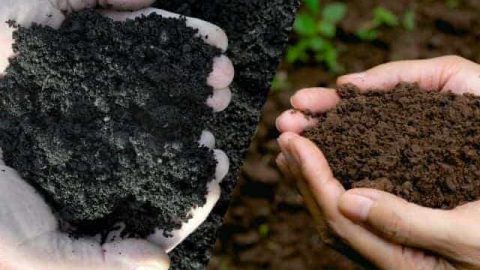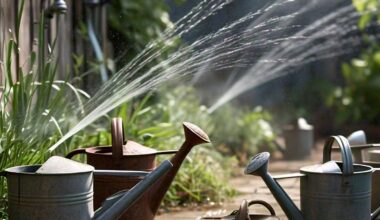You have always been wondering why some gardens do well while others don’t even though they are all under the same weather. It might be the soil amendments you use. Soil conditioners and compost are two common choices, but which is best for your garden? Soil conditioner vs compost
Many gardeners struggle with poor soil that hinders plant growth. That’s where soil amendments come in. They’re key to boosting soil health and giving plants the nutrients they need. But with so many options, picking the right one can be tough.

Let’s simplify it. Soil conditioners are tiny materials that improve soil structure and texture. They also add nutrients that plants need. Compost, on the other hand, is a mix of green and brown materials. It slowly releases nutrients, helping prevent plants from getting too much.
Choosing between soil conditioner and compost depends on your garden’s needs. If your soil lacks nutrients, compost might be the better choice. But if your soil structure is poor, a soil conditioner could help. A soil test can guide you in making the best choice for your garden’s health.
The Basics of Soil Amendments
Soil amendments are key for your plants to grow well. They make the soil better by improving its structure, adding nutrients, and boosting health. Let’s look at two main types: soil conditioners vs compost.
Soil Conditioners: Enhancing Soil Structure
Soil conditioners help make the soil better. They improve air flow, water holding, and fertility in poor or damaged soils. These can be organic or inorganic, depending on the soil’s needs.
Compost: Nature’s Nutrient Powerhouse
Compost is made from broken-down organic stuff like yard waste and kitchen scraps. It’s a natural way to make soil richer and support good microorganisms. Adding compost to your garden is a great way to make your soil more fertile.
The Vital Role of Soil Health
Healthy soil is crucial for gardening success. It supports plant growth, keeps water in, and gives plants the nutrients they need. Using soil amendments can make your soil better in many ways, leading to healthier plants and more food.
- Aim for 5-10% organic matter in vegetable and flower beds
- Use 8.33 cubic feet of compost to cover 100 sq. ft. at 1-inch depth
- Consider manure-based composts for higher nutrient content
Understanding your soil’s needs is key to gardening success. Choosing the right amendments, like soil conditioners or compost, will help your garden flourish.
Soil Conditioner vs Compost: Key Differences
It’s important to know the differences between soil conditioners and compost for healthy plants. These additives have different roles in making your garden thrive.
Composition and Particle Size
Soil conditioners have smaller particles than compost. They aim to improve soil structure and texture. Compost, with its larger particles, is like garden soil. It’s rich in decayed organic matter, boosting soil fertility.

Primary Functions
Soil conditioners work on the physical aspects of soil. They help with aeration, water retention, and nutrient uptake. They’re great for soils that are clay or hard and have poor drainage. Compost, however, adds nutrients, supports beneficial microbes, and fights diseases.
Application Methods
You can use soil conditioners in several ways:
- Mix directly into the soil
- Dilute in water
- Add in liquid form
Compost is usually mixed into the soil like a fertilizer. It holds water and slowly releases it, helping plants grow over time.
Choosing between soil conditioner and compost depends on your soil and plants’ needs. Both are crucial for better soil quality and healthy plant growth through various composting methods.
Benefits of Using Soil Conditioners

- Soil conditioners bring many benefits to gardens and farms. They make the soil better for plants by improving texture and nutrition. They also help roots grow and absorb nutrients well.
- Soil conditioners help with air and water in the soil. This means plants grow healthier. For example, compost can make soil hold up to 10% more water, so you water less often.
- They also keep the soil’s pH balanced. This is good for plants. Some conditioners, like lime, make soil more alkaline. Others, like peat moss, make it more acidic.
- Soil conditioners boost the good bugs in soil. These bugs help break down organic stuff and make nutrients available. Adding organic conditioners can increase these beneficial bugs by up to 25%.
Not all soils need the same conditioners. For example, clay soils get better with gypsum for drainage. Sandy soils benefit from organic matter for holding water. Always test your soil first to pick the right conditioner.
Advantages of Incorporating Compost
Compost is great for your garden, making it a top pick for eco-friendly gardening. It turns your garden into a lively ecosystem with nutrient-rich soil.
Nutrient Enrichment
Adding compost to your soil boosts its nutrient levels. It’s full of potassium, calcium, phosphorus, and magnesium, which plants need to grow well. This makes your soil rich in nutrients, helping plants thrive.
Microbial Activity Enhancement
Compost is full of good microbes that make soil healthier. These tiny helpers break down organic stuff, slowly releasing nutrients. This makes the soil better at holding water, helping your garden survive dry spells.
Sustainable Gardening Practices
Using compost fits well with eco-friendly gardening. It’s a smart way to reuse kitchen and yard waste. By making your own compost, you cut down on waste and create a cycle in your garden. Just remember, don’t add more than 50% compost to your soil to keep plants growing well.
In Summary
The secret to a thriving garden often lies beneath the surface, in the health of your soil. This guide explored the two essential players in soil improvement: soil conditioners and compost.
Soil conditioners are the architects of strong soil structure. They act like tiny building blocks, improving drainage, aeration, and nutrient absorption. Compost, on the other hand, is nature’s nutrient powerhouse. Packed with decomposed organic matter, it gradually releases essential elements for plant growth.
The winning formula depends on your specific situation. If your soil is nutrient-depleted or lacks organic matter, compost is your champion. If poor drainage or compaction is the issue, a soil conditioner will work wonders.
Consider creating your own compost pile. It’s a fantastic way to recycle yard waste and kitchen scraps while producing a valuable soil amendment for your garden.


